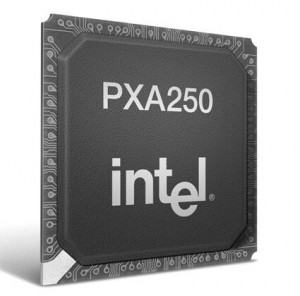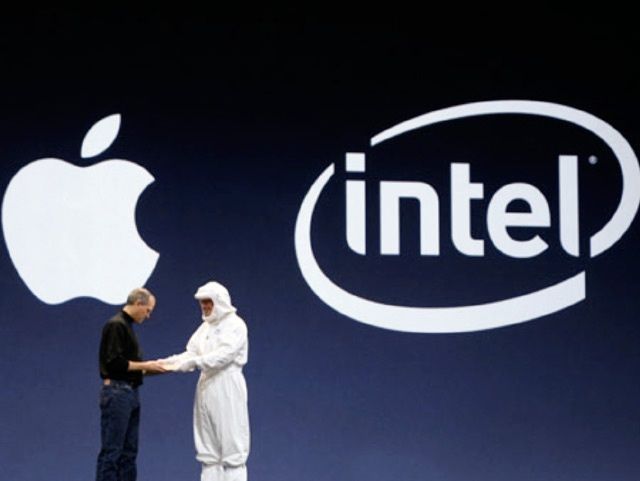Intel and Apple, teaming up to make A-series chips for the iPhone and iPad? That’s what the rumors are saying, with a recent Reuters report going so far as to claim that executives from both companies have actually met to discuss the possibility of the x86 maker pumping out ARM chips custom designed by Apple!
“Intel Once Again Rumored To Be Working On iOS Device Chips With Apple,” read our headline this morning. But would Intel really cash in on its x86 heritage to make ARM chips? And if Apple did switch, would that really be a win for everyone?
The short answer? Yes, Intel would make ARM chips for Apple. But no, it probably wouldn’t be a win for either company. Here’s why.
Intel & ARM
First things first. Would Intel really make ARM chips for Apple instead of x86 chips? (For a decent explanation on the difference between the chips, read our previous article on why you’ll probably never own a MacBook with an ARM processor.)

Sure. While Intel is best known for doing x86 chips like the ones that power your Mac, they aren’t averse to doing other things. Intel started off back in 1968 making memory, and it was only in 1983 that the company started focussing on microprocessors. Heck, Intel’s even made ARM chips before: from 2002 until Intel sold the family to Marvell in 2006, the X86 giant made XScale chips with the ARMv5 architecture.
So Intel could easily start making ARM chips. But there’s a simple reason right now why they don’t: money.
“Intel is a business, and making other people’s chip designs for them just doesn’t make a lot of money,” says David Kanter, principal analyst and Editor-In-Chief at Real World Technologies, a technology analysis firm specializing in x86 and RISC microprocessors. Contract manufacturing isn’t a lucrative business compared to making chips you intend to sell yourself.
Making other people’s chip designs for them just doesn’t make a lot of money.
Right now in the ARM space, companies are paying a lot less per wafer — a thin layer of raw semiconducting material from which full thousands of microchips are carved, etched and finished — than Intel can make turning that same wafer into the laptop and desktop processors it sells itself. Intel might make up to $100,000 on a wafer it turns into x86 chips, compared to just $10,000 it made for someone else, says Kanter.
So from a financial perspective, making ARM chips for a company like Apple doesn’t necessarily make a lot of sense, except in one situation.
Advantages For Intel

Chips are made in giant semiconductor fabrication plants called fabs. Intel’s got the most advanced fabs in the business, producing chips that are using technology literally one to two years ahead of what other chip makers like Samsung, TSMC and Global Foundries can make.
These fabs, though, are expensive to set up, and expensive to keep running. If a fab isn’t producing every nanometer of silicon it can at every second of the day, it ends up costing the company money.
So if Intel has fabs that aren’t outputting as many wafers as they could because there’s not enough x86 demand out there, it might make sense for Intel to accept lower revenue per wafer for a client like Apple.
There’d be another possible advantage to Intel for doing this too.
Intel’s fabrication tech is a year or two ahead of everyone else.
Intel’s fabrication tech is a year or two ahead of everyone else out there, which means Intel can make chips that are smaller, faster and have lower-power usage than everyone else, at least in theory. But companies like TSMC and Samsung are catching up, as clients like Apple pressure them (and spend billions of dollars for them) to constantly improve their technology.
So if Intel could take away an extremely demanding and high-ordering client like Apple from Samsung or TSMC, their fabs might shrivel up, and Intel could increase it’s technological lead over them.
What about Apple’s incentives, though? Why would they want to take their chip manufacturing to Intel?
Advantages For Apple
The obvious answer is Samsung.
Right now, the bulk of Apple’s chips come from Samsung, Cupertino’s biggest competitor in the mobile market. That gives Samsung a number of advantages in being able to predict what Apple is going to be doing next… and maneuvering their own mobile business to head Apple off.
It’s always awkward when your foundry is a direct competitor.”
“It’s always awkward when your foundry is a direct competitor,” says Kanter. A foundry is a fab that makes other company’s chip designs.
But Intel isn’t a direct competitor in the mobile space. Intel is never going to release a smartphone, or a tablet. And their chipmaking technology is light years ahead of everyone else’s, which would technically allow Apple to release A-series chips that were literally years ahead of anything Samsung could produce in speed and power-usage.
Sounds like a match made in heaven, doesn’t it? Apple switches to Intel, makes fantastic ARM chips that no other manufacturer can even touch, and Intel gets to stick it to its competitor and get a foot into the mobile space.
Well… not so fast.
Why An Intel/Apple iDevice Alliance Is Probably A Bad Idea

While an Apple/Intel iPhone alliance seems rosy on the surface, there are actually significant reasons why neither company would be eager to forge one right now.
As we’ve already mentioned, from Intel’s perspective, making ARM chips for Apple would make them a lot less money than using those same fabs to make x86 chips they could then sell to gadget makers themselves.
“Foundries just don’t make a lot of money,” says Kanter. “This is a much lower margin product.”
Even worse, if Intel started making ARM chips for Apple, it would be signalling that they had given up on pushing x86 in mobile. And since mobile is the future of computing, and x86 processors Intel can sell to gadget makers makes them far more money than making ARM chips for Apple… well, you do the math. Intel would be trading in the possibility of an extremely lucrative future for a much less lucrative present.
And what about Apple?
The major reason Apple would be unwilling to go into bed with Intel making A-series chips is that it would give Intel way too much power over Cupertino.
Right now, Intel provides all of the processors for the Mac side of Apple’s business. Even if Apple and Intel had a falling out, it would be almost impossible for Apple to take its business elsewhere at this point: Intel’s chips are simply that much better than everyone else’s. The entire experience of using a Mac would notably degrade.
If Intel started making iPhone chips for Apple, it would give Intel total control over Apple’s product destiny.
If Intel started making chips for Apple on the iPhone or iPad side of things, it would be great from a technical perspective. But it would give Intel total control over Apple’s destiny.
“Once you switch to Intel, you’re locked in. You can’t go anywhere else, because no one is up to Intel’s standard,” says Kanter.
Conclusion
So imagine this, because Apple would imagine it. Intel and Apple come to an agreement where Intel starts making their ARM-based, A-series chips. Intel being Intel, they make chips for Apple that just blow every other ARM-based smartphone or tablet out of the water.
But five years down the line, Intel comes to Apple and says, “Hey, we’re not going to make ARM chips for you anymore at $10,000 a wafer. Instead, the only thing we’ll agree to is selling you x86 chips at a much higher cost.”
What’s Apple going to do then? They have no negotiating position: Intel powers every product they make.
“Apple’s ideal relationship with a supplier is that the supplier holds a handrail and gets ready for a ride,” explains Kanter. “Intel has been very flexible working with Apple so far, and it has made them a less obnoxious company. But Intel also has a history of dictating terms to its customers. If everything runs off of Intel, that’s too much of a risk.”
So sure, Intel and Apple are willing to talk about teaming up to make A-series chips, but ultimately, it’s a bad proposition for both of them.
“Never say never, but there’s probably not a high probability of it happening,” says Kanter.
Many thanks to David Kanter of Real World Tech for help researching this article!
![Why Apple And Intel Probably Aren’t Going To Team Up To Make iPhone Chips [Feature] intela5](https://www.cultofmac.com/wp-content/uploads/2013/03/intela51.jpg)


